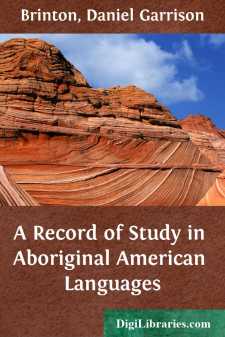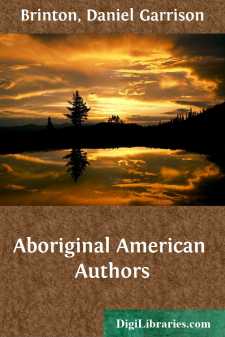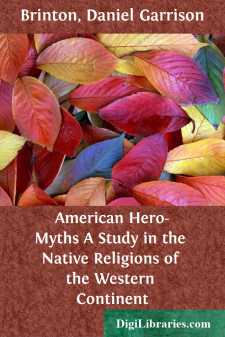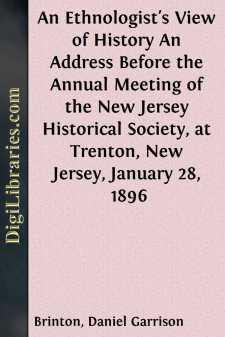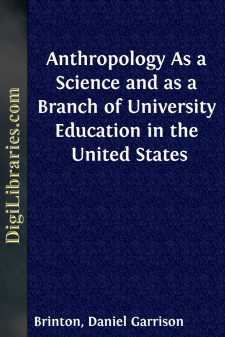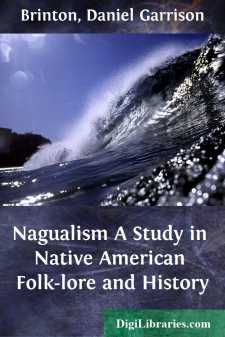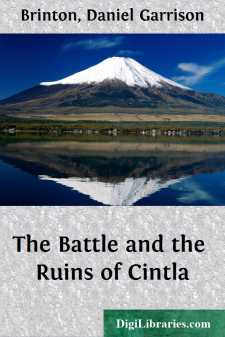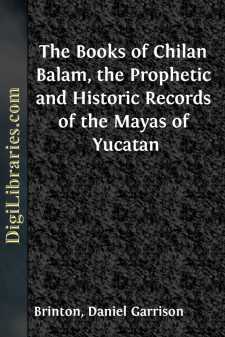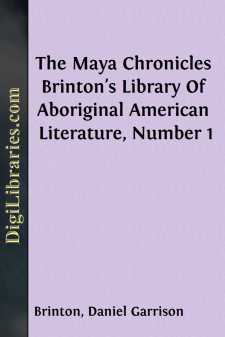Categories
- Antiques & Collectibles 13
- Architecture 36
- Art 48
- Bibles 22
- Biography & Autobiography 813
- Body, Mind & Spirit 142
- Business & Economics 28
- Children's Books 17
- Children's Fiction 14
- Computers 4
- Cooking 94
- Crafts & Hobbies 4
- Drama 346
- Education 46
- Family & Relationships 57
- Fiction 11829
- Games 19
- Gardening 17
- Health & Fitness 34
- History 1377
- House & Home 1
- Humor 147
- Juvenile Fiction 1873
- Juvenile Nonfiction 202
- Language Arts & Disciplines 88
- Law 16
- Literary Collections 686
- Literary Criticism 179
- Mathematics 13
- Medical 41
- Music 40
- Nature 179
- Non-Classifiable 1768
- Performing Arts 7
- Periodicals 1453
- Philosophy 64
- Photography 2
- Poetry 896
- Political Science 203
- Psychology 42
- Reference 154
- Religion 513
- Science 126
- Self-Help 84
- Social Science 81
- Sports & Recreation 34
- Study Aids 3
- Technology & Engineering 59
- Transportation 23
- Travel 463
- True Crime 29
Daniel Garrison Brinton
Daniel Garrison Brinton was a notable American archaeologist, ethnologist, and linguist, renowned for his significant contributions to the study of indigenous American cultures and languages. Born in 1837, Brinton authored several influential works, including "The Myths of the New World" and "A Grammar of the Cakchiquel Language". He held professorial positions at the University of Pennsylvania and was a pioneer in integrating anthropology and history in his research.
Author's Books:
Sort by:
General Articles and Works. 1. The Philosophic Grammar of American Languages as set forth by Wilhelm von Humboldt; with the translation of an unpublished Memoir by him on the American Verb. pp. 51. In Proceedings of the American Philosophical Society, 1885. 2. On Polysynthesis and Incorporation as characteristics of American Languages. pp. 41. In Proceedings of the American Philosophical Society, 1885....
more...
Introductory. When even a quite intelligent person hears about "Aboriginal American Literature," he is very excusable for asking: What is meant by the term? Where is this literature? In fine, Is there any such thing? To answer such inquiries, I propose to treat, with as much brevity as practicable, of the literary efforts of the aborigines of this continent, a chapter in the general History of...
more...
CHAPTER I. INTRODUCTORY. SOME KIND OF RELIGION FOUND AMONG ALL MEN--CLASSIFICATIONS OF RELIGIONS--THE PURPOSE OF RELIGIONS--RELIGIONS OF RITE AND OF CREED--THE MYTH GROWS IN THE FIRST OF THESE--INTENT AND MEANING OF THE MYTH. PROCESSES OF MYTH-BUILDING IN AMERICA--PERSONIFICATION. PARONYMS AND HOMONYMS--OTOSIS--POLYONOMY--HENOTHEISM--BORROWING--RHETORICAL FIGURES--ABSTRACT EXPRESSIONS. ESOTERIC...
more...
Mr. President, etc.: I appear before you to-night to enter a plea for one of the most neglected branches of learning, for a study usually considered hopelessly dry and unproductive,—that of American aboriginal languages. It might be thought that such a topic, in America and among Americans, would attract a reasonably large number of students. The interest which attaches to our native soil and to the...
more...
The intelligent thought of the world is ever advancing to a fuller appreciation of the worth of the past to the present and the future. Never before have associations, societies and journals devoted to historical studies been so numerous. All times and tribes are searched for memorials; the remote corners of modern, medieval and ancient periods are brought under scrutiny; and going beyond these again,...
more...
ANTHROPOLOGY,AS A SCIENCE,ANDAs a Branch of University Education. What Anthropology Is. Man himself is the only final measure of his own activities. To his own force and faculties all other tests are in the end referred. All sciences and arts, all pleasures and pursuits, are assigned their respective rank in his interest by reference to those physical powers and mental processes which are peculiarly...
more...
1. The words, a nagual, nagualism, a nagualist, have been current in English prose for more than seventy years; they are found during that time in a variety of books published in England and the United States, yet are not to be discovered in any dictionary of the English language; nor has Nagualism a place in any of the numerous encyclopædias or “Conversation Lexicons,” in English, French, German...
more...
The first battle on the American continent in which horses were used was that of Cintla in Tabasco, March, 1519, the European troops being under the leadership of Hernando Cortes. This fact attaches something more than an ordinary historic interest to the engagement, at least enough to make it desirable to ascertain its precise locality and its proper name. Both of these are in doubt, as well as the...
more...
ivilization in ancient America rose to its highest level among the Mayas of Yucatan. Not to speak of the architectural monuments which still remain to attest this, we have the evidence of the earliest missionaries to the fact that they alone, of all the natives of the New World, possessed a literature written in “letters and characters,” preserved in volumes neatly bound, the paper manufactured...
more...
INTRODUCTION. CONTENTS. 1. The Name “Maya.” 2. The Maya Linguistic Family. 3. Origin of the Maya Tribes. 4. Political Condition at the time of the Conquest. 5. Grammatical Observations. 6. The Numeral System. 7. The Calendar. 8. Ancient Hieroglyphic Books. 9. Modern Maya Manuscripts. 10. Grammars And Dictionaries of the Language. § 1. The Name “Maya.” In his second voyage, Columbus heard vague...
more...


